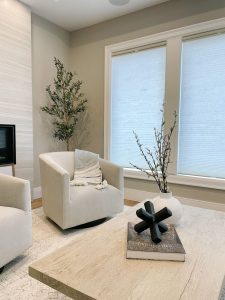
Jess Wageman, Realtor® at Coldwell Banker Oceanside and owner of Interior Design Company, Jess Wageman Homes.
VICTORIA – In any industry, trends are often momentary influences that reflect a currently popular aesthetic in culture. They are fleeting, they come in and then are replaced just as quickly. However, there is one influence that will never go out of style: sustainability.
“Sustainability is not going anywhere,” said Jess Wageman, Realtor® at Coldwell Banker Oceanside and Owner of Interior Design Company, Jess Wageman Homes. “Businesses need to have options for their consumers to make eco-friendly choices, so evolving their platforms and products is a must in moving forward.”
Since COVID-19, Wageman has noticed home-owners putting a lot more thought into the interior of their homes and, luckily for her, she experienced an uptick in her business. However, when she started to look for products to source and stores to buy from, she noticed a lack of inventory, especially for budget-conscious clients.
“Even though sustainability is becoming more popular in smaller products, it’s still not very common in the furniture industry or at least readily available,” said Wageman. “A lot of the products are just as damaging as fast fashion but, in this case, fast furniture.”
As a child, Wageman would see beautiful decor in homes or stores, however, she didn’t have the means to buy much. Instead, she would take the idea and make it herself, allowing her to strengthen that resourcefulness skill.
“I would just recreate what I saw out there,” said Wageman. “I taught myself how to use power tools which empowered me to make stuff by hand, so that’s what I did and now I feel it has come full circle and I can integrate it into my business practices.”

A beautifully styled interior by Jess Wageman, owner of Jess Wageman Homes
Wageman also noticed another new influence after the pandemic.
“I think since so many people began to spend so much time inside their homes, the shift started to move away from the ultra-modern interior design vibe, which has always felt very cold,” said Wageman. “Especially since the pandemic, people are wanting a lot more warmth and want to focus on how a space makes you feel, both physically and emotionally.”
This bodes well for sustainability, as Wageman encourages her clients to support local brands, bring new life to old furniture, upcycle vintage pieces, and bring the outdoors in. Since her childhood, Wageman has always been DIYing and now she delights in finding new ways to reduce waste and reuse items that compliment a space.
“I love sourcing from local artists and market-places to create warmer homes with lots of texture, and bring things back-to-basics with natural elements focusing on biophilic design,” said Wageman.
Wageman is diving deeper into the world of sustainability as the industry is ever evolving. As a member of the Canada Green Building Council, she is always learning about how to create healthier, more eco-friendly and sustainable interiors.
Some of her favourite sustainable practices include using materials such as bamboo, re-claimed wood and low-VOC paints. She pro-motes energy-efficient lighting and HVAC systems, recycling, up-cycling, sourcing local when possible and as always, biophilic design for overall well-being. These are little steps that move the needle in the right direction.
“I want my clients to be aware and understand that sustainable design is here to stay, and my business is fully committed to decreasing that carbon footprint wherever possible,” said Wageman. “Not only do we focus on creating visually appealing and functional spaces, but we also place a strong emphasis on environmental responsibility and global sustainability.”

By Tyler Nyquvest


